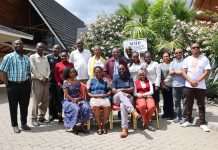BY Leopold Obi
Climate change lobby groups at the COP25 climate change conference in Madrid are demanding for proper financial flow to developing countries to enable them respond urgently to rising climate disasters.
The activists say that while climate change disaster have been rising over the years especially in Africa where at least 580 people were recently killed in Mozambique by deadly cyclones while another 60 people died last week in Kenya following heavy rainfall and landslide- many African countries lack the finances to prepare or deal with the emergencies.
In 2013 during the 19th United Nations Framework Convention on Climate Change (UNFCC) conference of Parties (COP19) held in Warsaw, Poland, world leaders and scientists established the Warsaw International Mechanism (WIM) as a tool to provide financial support for losses and damages caused by impacts of climate change in vulnerable countries.
The funds were supposed to come from developed countries who are being blamed of heavy carbon emissions which are exacerbating climate change.
However, six years after the creation of WIM, the mechanism has been ‘non-operational’ according to the lobbyists who further accused developed countries of frustrating financial mobilization efforts towards the fight against climate change.
Harjeet Singh, Global Lead on Climate Change at ActionAid, argues that the current body -WIM- is too bureaucratic and slow and therefore not helpful for the countries who need urgent funds in responding to emergencies.
Mr Singh explained that presently a country that needs to benefit from the funds such the green climate fund has to write a proposal which takes several months to be considered in the process delaying disaster response.
The Intergovernmental Panel on climate change (IPCC) revealed in its special report last year that parts of Africa are already experiencing 2 degrees warming meaning climate change could hit on the continent harder than any other region in the globe.
While climate emergencies namely heavy floods, drought and strong winds expected to become frequent, many African countries either do not have the technologies or the financial capacity to deal with the disasters.
Meanwhile, this African negotiators at the COP25 have used this report to successful submit a proposal to be given special financial consideration.
“There should be an automatic system to check whether people who have been displaced by disasters such as floods and cyclones are being protected against different kinds of violation and abuse they face,’ said Mr Singh during a media pressing at COP25 conference.
Countries like Kenya are currently battling devastating floods which has since displaced hundreds of people across the country, destroyed properties and worth millions of shillings besides claiming lives over 50 people in West Pokot County. Early this Mozambique was hard hit by a terrible typhoon which left at least 598 people dead while displacing more than 130,000 people.
“We are in 2019 when climate emergency is a proving a bigger threat therefore we can longer allow a system to only publish papers and hold workshop. We need a financing facility which should be operational in the next one year, “he added.
Jean Su, Energy Director at Center for Biological Diversity noted that people who are suffering the impacts of climate emergencies need immediate support, yet developing countries who are the big carbon emitter avoid taking responsibilities by providing funds to developing countries whose carbon emissions are almost negligible.
The lobby groups also demanded for a loss and damage gap report which looks at how impacts of climate change are increasing, how countries are battling climate change impacts, what support needs to be provided and how funds are going to be mobilized.
“This Paris Agreement or climate change convention is not just about shutting down coal plants and putting up wind farms and solar panels it is about people. We need to go beyond negations and make sure people are safe,” he said.
Gilles Dufrasne, Policy Officer at Carbon Market Watch, accused developing countries for shifting emissions instead of dealing with it saying that the move will not reduce emission. “It is unacceptable that there rich countries finance carbon emission projects in their countries while on the other hand invest in green energy projects in other countries. This is climate cheating” he said.





